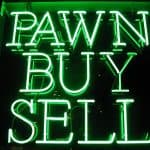 Pawn Shop Q & A
Pawn Shop Q & A
As the preconceived notions of pawn shops continue to be debunked, there are more and more people utilizing them for a means of cash, or to buy items they have for sale. When many people walk into a pawn shop for their first time, most are pleasantly surprised. Because they find that these stores are brightly lit, the shelves and cases display their items for sale in an appealing manner, and they are greeted by a friendly staff.
So, let us honestly answer some of the most asked questions about pawn shops, and how pawning and selling differ.
Do Pawn Shops Pay Cash?
Yes. This is one of the key reasons that people make the choice to take their valuables to a pawn shop. Whether a person chooses to pawn or sell their valuables, at the end of the transaction they are directly handed the offer in cash. Another benefit, is that the process, starting from the assessment, to completing the transaction, can take as little as 15 minutes from start to finish. Thereby, defining the term quick cash, and being the most appealing detail to their customers.
How Do Pawn Shops Determine The Value Of Items?
Pawn shops are staffed with pawnbrokers, who are the ones that determine the value of an item, and make a cash offer based on their assessment. The evaluations vary, depending on what the item is. The stores are well equipped with testing equipment and tools, to speed up the process of the assessment, and make you an offer as quickly as possible.
- Evaluations for tools, electronics, audio and video equipment, firearms and industrial equipment, etc., will consider if everything that the item came with is accounted for, its visual appeal, its working condition and the current market value (resale value).
- Bullion and jewelry are evaluated based on the purity of the precious metal, it’s weight and the spot price.
- Luxury items such as handbags, and accessories are authenticated first, and then the evaluation considers their visual appeal, overall condition, and their resale value.
What Can I Do To Make Sure That I Get The Highest Amount Offered?
There are three things that you should always do prior to taking them to a pawn shop to sell or pawn:
- Make sure that anything and everything that the item came with at the time of purchase, are gathered and brought in with the item itself.
- Take the time to clean and prepare the valuable items, to present them in their best possible condition to the pawnbroker.
- If you still have your sales receipts and/or the original box or packaging they came in, bring them with you as well.
Is It Better To Pawn Or Sell At Pawn Shops?
When you sell an item outright to a pawn shop, the offer is always more. At some pawn shops there is only a slight difference, at others the difference in offers may be significant. Therefore, many find this to be the most important issue, and have no issues with relinquishing that item.
When you pawn an item, your are given cash on a loan, that must be paid in full, within the time frame of the contract. You pay back the principal plus interest that accrues daily, on these short term loans. Pawn loans are helpful when your need for cash needs to happen quickly, and is only a temporary impediment. Therefore, not being an issue to pay off the loan, not only before the contract expires, but even paying it off early, without causing yourself any more financial distress.
Is It Better To Pawn Or Sell Gold?
- Considering that gold is a precious metal and a commodity, it’s value does not diminish like most valuables sold or pawned. It’s demand is always higher than it’s supply, which keeps its value from fluctuating severely. The payout for gold can be 50% – 80% of its value, based on its purity, weight, and the current spot price. Out of all the valuable items a pawn shop may take in, gold is one of the highest payouts you can receive. Therefore, most advice concludes it is best to sell it, get the cash and get back on your feet.
- Is It Better To Pawn Or Sell Jewelry?
- The resale value of jewelry, mostly depends on the valued weight of the precious metal, and if the piece has a diamond setting, its grade and value of the precious gems. Jewelry that is a family heirloom, or has particular sentimental value to the person, is usually pawned. Otherwise, jewelry tends to be sold, to get the cash, and free and clear from any further obligations.
How Does Pawning Work?
The loans from pawn shops have appeal, because they are a means to quick cash, and are confidential. They do not affect your credit score, nor require your financial history and status to be approved. Pawn loans are based solely on the resale value of your item, and then you are lent a percentage of its based value.
If the offer is accepted, to complete the paperwork, all you need is a current and valid driver’s license or ID, and a few signatures to complete the paperwork. For the duration of the loan, the items are secured and kept safe at the pawn shop, waiting for your return.
There is no payment plan or scheduled payments with a pawn loan. Although, you can make payments on your own accord during the contract, or pay it off in full. Once the loan is paid in full, the item(s) are returned to you.
If you default on the loan, the item of value becomes the property of the pawn shop, and then they sell it to recoup their money.
Can Pawn Shops Sell Pawned Items?
As long as a pawn loan has not been defaulted, the answer is a firm NO! The contract, or pawn ticket that you sign is a written and legal agreement. And fully states that for the duration of the loan, your items are kept safe, and given back to you in the same condition as they were received. Therefore, when an item is pawned, any and all items are tagged and assigned where they are placed in a locked and secured area at the facility, until the loan is satisfied, or expired.
How Long Can You Pawn Something For?
Across the country, pawn loans can be anywhere from 90 to 180 days per contract, and are aligned with not only federal, but also their state laws. However, if you are needing more time to pay off
Are Pawn Shops Regulated?
Yes. Pawn shops are regulated, limiting the interest rates they can charge, the length of the pawn loans, and report the merchandise that is pawned or sold to them to the county’s police department. In fact, in Arizona state laws, pawn shops are audited on a yearly basis, by the police department in order to renew their licenses. And if a pawn shop buys, sells and pawns firearms, they must be in compliance of the laws pursuant by the Bureau of Alcohol, Tobacco and Firearms, as a Federal Firearms Licensee.
Are Pawn Shops Worth It?
Yes, pawn shops are worth it, and are actually great contributors to their local economies. Because, there are times when you need fast cash, and do not have time to wait for a loan approval, or to see if you can sell it yourself. And the items that are sold in pawn shops gave cash to those that were in need, and then sell them to their surrounding communities, far below retail value. In addition, it means that quality merchandise is kept and used to its fullest potential, and keeping you from having to pay full price, for items that are still in their original box.
Pawn shops are not the answer for everyone… But many people, from all income levels, utilize their favorite pawn shop, whenever they need quick cash. Mostly, because it is an immediate access to cash, does not affect your credit score, and is a confidential means to get the cash you need, when you need it most!


 Pawn Shop Q & A
Pawn Shop Q & A Is It Better To Pawn Or Sell Gold?
Is It Better To Pawn Or Sell Gold?

